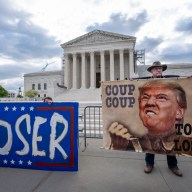KANDAHAR, Afghanistan – Voter registration in volatile Kandahar province has fallen short of what Afghan election officials had hoped to achieve, forcing an extension of the deadline for picking up cards in two of the province’s most violent districts.
By Wednesday’s deadline, roughly 258,000 people had stepped up to register for the Aug. 20 presidential election – about 100,000 fewer than the stated goal of Abdul Qahir Wasifi, the head of Afghanistan’s independent electoral commission.
The temporary offices in the restive districts of Zhari and Panjwaii, where Canadian troops have fought frequent, bloody battles with Taliban militants, will remain open for a few more days, he said.
“Perhaps there are some people in villages outside (who) may not have heard what is going on,” Wasifi said in an interview with The Canadian Press.
“They may be out in their communities and need more time.”
At the outset, the Taliban vowed to disrupt registration with direct attacks, but have ended up carrying out a determined campaign of intimidation – sowing the streets of Kandahar with dozens of improvised explosives, most of which were defused by security forces.
There has been a real sense of tension and fear in the country’s second-largest city, which suffered through a series of deadly and spectacular insurgent attacks in 2008.
The situation is even more perilous in some of the outlying districts, where registering to vote is tantamount to a death wish for locals.
There have “thankfully” been no direct assaults on registration centres, Wasifi said.
The initial plan called for the majority of the 37 satellite registration centres sprinkled around the province – guarded by Afghan police and army units – to close on Wednesday.
The fact there were no attacks and more than a quarter of a million residents were added to the voter rolls is a victory, said Brig.-Gen. Denis Thompson, the commander of Canadian forces in Afghanistan.
“People are voting with their feet,” said Thompson, who will soon hand over command after nine months on the ground.
“They’re taking whatever risk it is to go to the voter registration centres and to pickup their voter registration card in order to vote with the card; to use their vote as a weapon (against the Taliban). Voting is a weapon in a democracy.”
Thompson said it’s his sense that Afghan officials, who had been pessimistic at the beginning, are happy with the returns to date.
Five years ago, 598,636 Kandaharis were on the list to cast their ballots in the presidential election that saw Hamid Karzai elected to office with more than 50 per cent popular support. Those people are still eligible to cast ballots, in addition to the new registrants.
Even after the centres in Zhari and Panjwaii close, Wasifi said two registration offices in Kandahar city will remain open and voters will be able to get on the list up to election day.
Karzai’s government has been widely viewed as corrupt and largely powerless beyond the boundaries of the capital city of Kabul. His five-year term is set to expire in May, but the vote itself has been delayed until August amid security concerns.
He faces a number of potential rivals, including former cabinet ministers Abdullah Abdullah, Ashraf Ghani and Ali Ahmad Jalali. But his most serious challenger is likely Nangahar provincial governor Gul Agha Sherzai.
Former Finance Minister Anwar ul-Haq Ahady also resigned recently in order to run for the nationalist party Afghan Mellat.
















